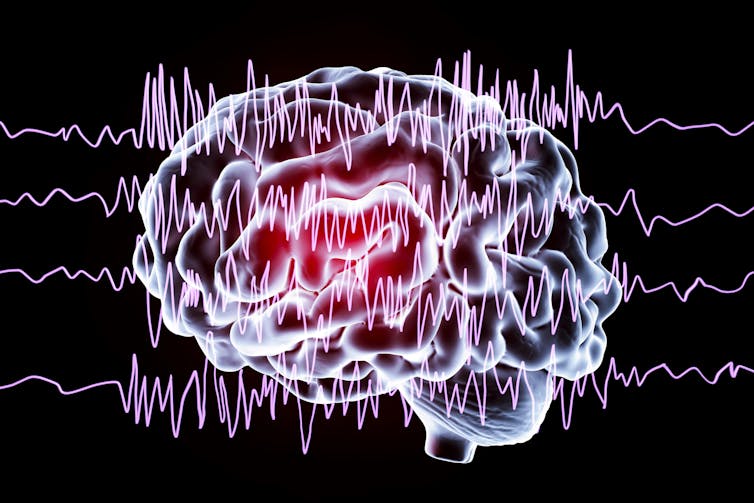Robert Baloh, University of California, Los Angeles
In early September 2021, a CIA agent was evacuated from Serbia in the latest case of what the world now knows as “Havana syndrome.”
Like most people, I first heard about Havana syndrome in the summer of 2017. Cuba was allegedly attacking employees of the U.S. Embassy in Havana in their homes and hotel rooms using a mysterious weapon. The victims reported a variety of symptoms, including headaches, dizziness, hearing loss, fatigue, mental fog and difficulty concentrating after hearing an eerie sound.
Over the next year and a half, many theories were put forward regarding the symptoms and how a weapon may have caused them. Despite the lack of hard evidence, many experts suggested that a weapon of some sort was causing the symptoms.
I am an emeritus professor of neurology who studies the inner ear, and my clinical focus is on dizziness and hearing loss. When news of these events broke, I was baffled. But after reading descriptions of the patients’ symptoms and test results, I began to doubt that some mysterious weapon was the cause.
I have seen patients with the same symptoms as the embassy employees on a regular basis in my Dizziness Clinic at the University of California, Los Angeles. Most have psychosomatic symptoms – meaning the symptoms are real but arise from stress or emotional causes, not external ones. With a little reassurance and some treatments to lessen their symptoms, they get better.
The available data on Havana syndrome matches closely with mass psychogenic illness – more commonly known as mass hysteria. So what is really happening with so–called Havana syndrome?

A mysterious illness
In late December 2016, an otherwise healthy undercover agent in his 30s arrived at the clinic of the U.S. Embassy in Cuba complaining of headaches, difficulty hearing and acute pain in his ear. The symptoms themselves were not alarming, but the agent reported that they developed after he heard “a beam of sound” that “seemed to have been directed at his home”.
As word of the presumed attack spread, other people in the embassy community reported similar experiences. A former CIA officer who was in Cuba at the time later noted that the first patient “was lobbying, if not coercing, people to report symptoms and to connect the dots.”
Patients from the U.S. Embassy were first sent to ear, nose and throat doctors at the University of Miami and then to brain specialists in Philadelphia. Physicians examined the embassy patients using a range of tests to measure hearing, balance and cognition. They also took MRIs of the patients’ brains. In the 21 patients examined, 15 to 18 experienced sleep disturbances and headaches as well as cognitive, auditory, balance and visual dysfunction. Despite these symptoms, brain MRIs and hearing tests were normal.
A flurry of articles appeared in the media, many accepting the notion of an attack.
From Cuba, Havana syndrome began to spread around the globe to embassies in China, Russia, Germany and Austria, and even to the streets of Washington.

A sonic or microwave weapon?
Initially, many experts and some of the physicians suggested that some sort of sonic weapon was to blame. The Miami team’s study in 2018 reported that 19 patients had dizziness caused by damage to the inner ear from some type of sonic weapon.
This hypothesis has for the most part been discredited due to flaws in the studies, the fact there is no evidence that any sonic weapon could selectively damage the brain and nothing else, and because biologists identified the sounds in recordings of the supposed weapon to be a Cuban species of cricket.
Some people have also proposed an alternative idea: a microwave radiation weapon.
This hypothesis gained credibility when in December 2020, the National Academy of Science released a report concluding that “pulsed radiofrequency energy” was a likely cause for symptoms in at least some of the patients.
If someone is exposed to high energy microwaves, they may sometimes briefly hear sounds. There is no actual sound, but in what is called the Frey effect, neurons in a person’s ear or brain are directly stimulated by microwaves and the person may “hear” a noise. These effects, though, are nothing like the sounds the victims described, and the simple fact that the sounds were recorded by several victims eliminates microwaves as the source. While directed energy weapons do exist, none that I know of could explain the symptoms or sounds reported by the embassy patients.
Despite all these stories and theories, there is a problem: No physician has found a medical cause for the symptoms. And after five years of extensive searching, no evidence of a weapon has been found.

Mass psychogenic illness
Mass psychogenic illness is a condition whereby people in a group feel sick because they think they have been exposed to something dangerous – even though there has been no actual exposure. For example, as telephones became widely available at the turn of the 20th century, numerous telephone operators became sick with concussion-like symptoms attributed to “acoustic shock.” But despite decades of reports, no research has ever confirmed the existence of acoustic shock.
I believe it is much more likely that mass psychogenic illness – not an energy weapon – is behind Havana syndrome.
Mass psychogenic illness typically begins in a stressful environment. Sometimes it starts when an individual with an unrelated illness believes something mysterious caused their symptoms. This person then spreads the idea to the people around them and even to other groups, and it is often amplified by overzealous health workers and the mass media. Well-documented cases of mass psychogenic illness – like the dancing plagues of the Middle Ages – have occurred for centuries and continue to occur on a regular basis around the world. The symptoms are real, the result of changes in brain connections and chemistry. They can also last for years.
The story of Havana syndrome looks to me like a textbook case of mass psychogenic illness. It started from a single undercover agent in Cuba – a person in what I imagine is a very stressful situation. This person had real symptoms, but blamed them on something mysterious – the strange sound he heard. He then told his colleagues at the embassy, and the idea spread. With the help of the media and medical community, the idea solidified and spread around the world. It checks all the boxes.
Interestingly, the December 2020 National Academy of Science report concluded that mass psychogenic illness was a reasonable explanation for the patients’ symptoms, particularly the chronic symptoms, but that it lacked “patient-level data” to make such a diagnosis.
The Cuban government itself has been investigating the supposed attacks over the years as well. The most detailed report, released on Sept. 13, 2021, concludes that there is no evidence of directed energy weapons and says that psychological causes are the only ones that cannot be dismissed.
While not as sensational as the idea of a new secret weapon, mass psychogenic illness has historical precedents and can explain the wide variety of symptoms, lack of brain or ear damage and the subsequent spread around the world.
[Understand new developments in science, health and technology, each week. Subscribe to The Conversation’s science newsletter.]
Robert Baloh, Professor of Neurology, University of California, Los Angeles
This article is republished from The Conversation under a Creative Commons license. Read the original article.












